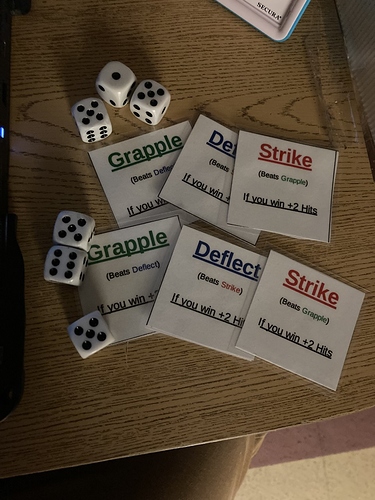Hey guys! Long time no see, how ya’ll doing? Me, just great - became a father a few months ago, got hospitalized for COVID, recovered, etc. Haven’t been able to game or even plan sessions for a while. But, for the past few days, I’ve had this dueling mini-game bubbling in my mind and only managed to get it down in my journal yesterday.
What: A dueling mini-game that uses dice and a form of rock-paper-scissors to settle disputes politely. The original idea was to make a system to represent a duel of skill in a social encounter, ie some snobbish noble challenges a player character to just show they are better than the heroes.
Need: Each player/duelist will need a set of three cards (one marked Strike, one marked Grapple, one marked Deflect) and 3D6
Structure: A Duel consists of Bouts; each Bout has two parts, the Flurry of Blades or just Flurry, and the Decisive Move.
Steps
When a challenge to a duel is issued and then accepted, a duel begins with the Flurry of Blades:
- Flurry of Blades - Each player rolls 3D6 and count Hits as follows:
- Any number rolled above a 1 counts as a Hit
- Any 6s rolled is a Critical and counts as a Double Hit
- Any 1s rolled is a Fumble and it awards the opponent a bonus Hit
- If both sides Fumble, neither gets the bonus Hit.
Count the Hits and then proceed to the Decisive Move:
- Decisive Move - Each player chooses a card from their set (be it Strike, Grapple, or Deflect) and, when ready, reveal the cards at the same time:
- Strike Beats Grapple
- Grapple Beats Deflect
- Deflect Beats Strike
- The winner gains two Bonus Hits
Tally the Hits; the player with the most Hits wins the Bout.
A Few Notes
All Abstract: The Flurry and Decisive Move represents a cinematic style of dueling, where blows are traded with speed and precision. The dice and the Hits scored do not represent individual strikes or damage dealt. Instead, they represent one duelist gaining the upper hand in some way before making a decisive move to win the bout.
How Many Bouts?: Depends entirely on the needs of the GM/encounter, though maybe 3 to 5 bouts should be okay for those 2-out-of-3 or 3-out-of-5 situations.
Dealing Damage: If needed, the winner of a bout rolls Weapon Effort to deal damage. Or damage can be the positive-sum between Hits. Or you can simply have the winner of the duel do a coup-de-grace against their helpless opponent.
Example of Play
Low Noble Karto, disgusted by the presence of dirty adventurers at his birthday party, challenges Garth the Fighter to a duel. With no choice but to accept, Garth readies his weapon as Karto shows a sadistic glee.
- Flurry of Blades - Garth and Karto both roll their 3D6s. Garth gets a 2,5, and 6 while Karto gets a 1, 3, and 5.
- Garth has 4 Hits (one each for rolling a 2 and a 5, then two Hits for rolling a 6)
- Karto has 2 Hits (one each for rolling a 3 and a 5)
- Garth gets a bonus Hit because of Karto rolling a 1 (a Fumble), making a total of 5 Hits.
- Decisive Move - After much thinking, Garth picks the Strike card whilst Karto picks the Grapple card. Ready, they reveal their cards.
- As Strike Beats Grapple, Garth gets another two Hits, giving the fighter a total of 7 Hits and winning the bout.
Karto attempts a sneaky trip against Garth, but the fighter deftly hops over the sweep and smashes his pommel against the noble’s face. Knocked senseless, the noble found himself sprawled across the tiled floor like a rug. The room goes quiet, and all eyes go from defeated Karto to the victorious Garth.
“Oh no,” sighed the rest of Garth’s fellow adventurers.
–
Let me know what you guys think. I have yet to use this in my game to test it, so it may seem wonky in some ways.

